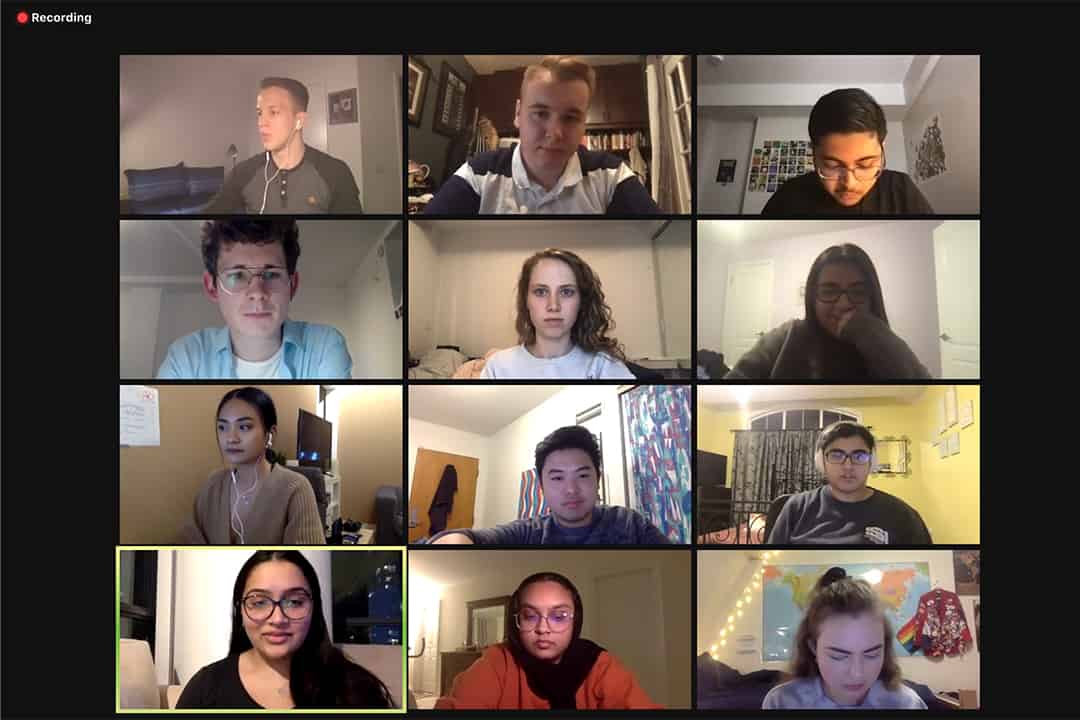The University of Toronto Students’ Union (UTSU) Board of Directors meeting on November 30 sparked a debate after Vanshika Dhawan, the director for the Faculty of Law, accused the executives of breaching policy. The discussion soon shifted to one of accountability and the strains of the pandemic.
Directors and executives also discussed advocacy. Executives reassured the board that they were pushing for consultations with the administration on the university-mandated leave of absence policy (UMLAP) and that they wanted to focus on academic forgiveness in future advocacy efforts.
Directors’ criticisms and policy debate
During the seventh Executive Committee meeting of the 2020–2021 academic year, the executives voted to replace the vice-president student life with the vice-president equity on the Campaigns and Outreach Committee.
However, since committee positions are part of the Committees of the Board of Directors Policy, any changes have to be approved by the board first, leading to the accusation of a policy breach. The concern stemmed from the fact that the change was not brought before the board before the discussion at the Executive Committee meeting.
The UTSU executives responded in an email to The Varsity that since the change was only being discussed at the Executive Committee meeting and was not actually in effect until it was approved by the Board of Directors, “the use of the word ‘breached’ may be misleading.”
“Governing documents are not meant to be suggestions,” Dhawan, who brought up the breach of policy at the meeting, wrote in an email to The Varsity. “They have multi-stepped, time consuming processes, and these exist precisely because changing governing documents is a consequential task that fundamentally requires… consideration from our members and Board of Directors.”
In an email to The Varsity, the UTSU executives wrote that the argument came down to a misunderstanding and they would prepare additional resources to ensure the organization was “on the same page.”
The conversation shifted to include a broader discussion of the responsibility of executives to members and the Board of Directors, and to accountability more generally. “The fact that our law director specifically happened to notice that this decision broke policy is fortunate, but that should not be the norm,” Social Sciences Director Alex Erickson said in support of Dhawan’s concerns.
Following accusations at the meeting that the executive considers policies or bylaws optional, both Vice-President Public and University Affairs Tyler Riches and Vice-President Operations Dermot O’Halloran spoke to disagree with that characterization.
Some directors also argued that they had already given the executive a lot of leeway with deadlines. The executive responded that the pandemic had made things more challenging for all governing bodies and that they had given leeway to the board as well. However, some directors noted that while the Board of Directors served as volunteers, the executives had a greater responsibility because they were paid.
They concluded that while discussion over the resolution had caused a “notable rift” at the meeting, “it was not representative of the work that’s been done this year.”
UTSU advocacy and accomplishments
In updates from executives, the directors were informed that the Student Aid Program budget was increased by $45,000. This will provide students facing food and financial insecurity with additional support. Moreover, trip cancellation coverage offered through the Student Aid Program increased to $3,000, and trip interruption and delay coverage from the same program increased to $7,500.
Directors also questioned executives about how they pushed forward the interests of U of T students during the Undergraduates of Canadian Research-Intensive Universities federal lobby week. The executive responded that they hadn’t consulted campus groups because federal advocacy tended to focus more on changes applicable across Canada.
Throughout the week, the UTSU’s advocacy included pushing for a two-year grace period on federal student loans and increasing funding for the Canada Student Grants project.
In response to a question about the UMLAP, Riches said that the university indicated that it would consult with students on the policy during this year’s review process. Riches also claimed that the UTSU would develop its own feedback process with students.
UTSU President Muntaka Ahmed added that, since the university had been ignoring the shift to academic forgiveness, the UTSU would focus future mental health efforts around that vision. “What we’re pushing on is the cultural shift in mental health, and pressing the faculty and divisions to recognize that, for students, it’s much more than just support.”


